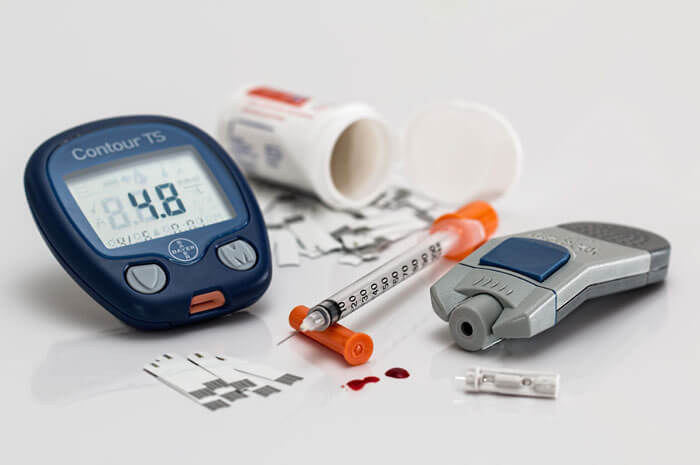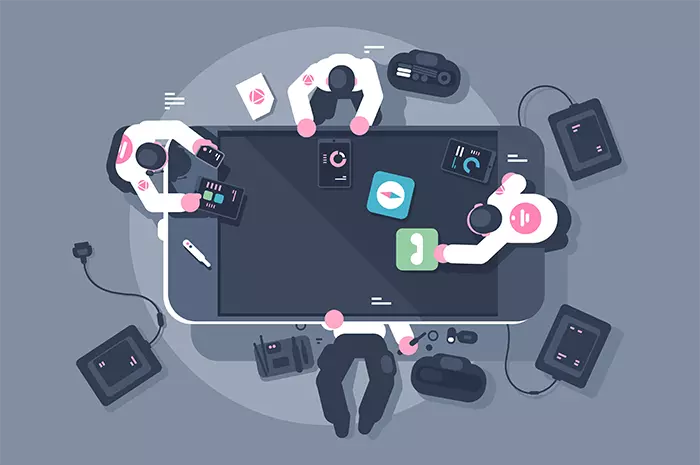Healthcare app development is transforming the medical industry from top to bottom. Everything from paperwork to patient interactions is seeing the impact of technology and benefit from the powerful improvements in efficiency and effectiveness that it brings.
For healthcare organizations interested in joining the movement, BluEnt has prepared this introduction to what types of medical applications are out there and how your company can use them to its advantage.
The Apple App Store cites applications that fall under the Medical category as "apps that are focused on:
Medical education,
Information management, or
Health reference for patients or healthcare professionals.
For example: skeletal, muscular, anatomy, medical record-keeping, diseases, symptom reference, companion devices (blood pressure, pulse, and so on), health tracking."
1. Medical Education
Healthcare education isn't just for medical students anymore – all industry professionals are expected to keep up-to-date with the latest news, practices, and advice taking place around the world. A variety of healthcare apps have stepped in to fill this need, the most popular being Medscape. Such web and mobile applications give employees instant access to trustworthy, in-depth information from peer-reviewed medical journal articles and clinical studies, all presented through a simple user interface.
Learn more about Hippa App Development Solutions .
There are also many options for healthcare practitioners looking to refer educational apps to the general public. From fitness to wellness to nutrition, there are numerous apps that provide helpful tools to help the general public maintain a healthy lifestyle. These can include resources for stress relief, dietary coaching, and sports training.
Have you tried any medication education apps in the past? Send us a message and let us know your thoughts.
2. Information Management
For decades, every wall in a typical doctor's office was stacked with files containing medical records, prescriptions, patient charts, and other important documents that had nowhere else to go. But with technology comes change – and healthcare apps targeted at information management are turning paperwork obsolete.
Modern medical information management applications digitize documents to make them accessible from the nearest device. By consolidating all of the office's patient and administrative records in one place, everyday tasks like pharmacy searches, reviewing patient medical histories, scheduling diagnoses, and more are incorporated into a simple, easy and streamlined user experience. The cost savings and efficiency gained by this type of enterprise mobility apps are revolutionizing entire healthcare facilities at a faster and faster rate.
Of the three types of medical apps, this is the most companies choose to outsource. At BluEnt, we have extensive experience in custom application development for healthcare companies. This includes industry-specific technology like those mentioned above, but also organization-wide applications like desktop sharing, and audio, video & text chatting tools. Our clients have not only seen an increase in employee productivity, but engage better with patients after introducing our enterprise mobility solutions.
3. Health Reference
With the rise of the internet, one of the biggest struggles to emerge in the healthcare industry has been finding reliable, user-friendly sources of medical information. Healthcare reference apps aim to be the solution to this problem.
Rather than pulling outdated textbooks, scanning a constant stream of case studies, and sifting through page after page of a Google search, they offer an organized database of current medical information from a user's mobile or tablet. The wealth of data that can be organized and distributed to an entire organization's worth of healthcare professionals is astounding. These mobile apps can thus be used as reference guide or companion to medical practitioners such as specialized surgeons, providing on-the-spot information on a given subject wherever they are.
While there are plenty of readymade solutions out there, we recommend building custom application solutions for high-quality organization-specific uses. Fill out a form to find out what BluEnt could build for your operational needs.
Now that we've broken down the different types of healthcare apps, let's talk about which app development option you should choose:
Native apps
Web apps
Hybrid apps
Cloud apps
Native Apps
A native app is an app that users download straight to their phone or tablet from a marketplace like the Apple App Store or the Google Play Store. They must be specifically developed for a particular device, such as iPhone or Android. Choose native apps if you're looking for:
Speed, reliability, and/or responsiveness
No need for an internet connection
Access to mobile hardware and native features (ex. Camera, accelerometer, microphone)
Push notifications to alert users to updates or new in-app information
Web Apps
A web app is an Internet-enabled app that users must access via the web browser on their device. Since the user experience is optimized for responsive UX & UI on any device, it need not be downloaded for users to open the app.
Choose web apps if you're looking for:
Accessibility from any device with an internet connection and web browser
Cost-efficiency and quick development process
Hybrid Apps
A hybrid app is a cross between native apps and web apps. As such, they are useful for those looking for applications that share benefits with both categories but do not require the full functionalities of either
Choose hybrid apps if you're looking for:
Accessibility from a variety of devices
Quick development process
Flexibility to change platforms and add to app functionality
Cloud Apps
A cloud app also share characteristics of native apps and web apps but have the added bonus of functioning in the Cloud. Its software runs as an online service on multiple servers for multiple users at a time.
Choose cloud apps if you're looking for:
Improved access control, redundancy and scalability
Accessible from anywhere, without the need for an internet connection
Access from the web or an app installed in a specific device
Advanced data, backup and security maintenance and support
At BluEnt, our most popular cloud apps include solutions designed for patient records, reports, and appointment management systems as used by hospitals, labs and doctors. Not only do we build solutions from scratch, but our team of developers is also experienced in converting existing IT environments to the cloud at affordable rates.
For more in-depth information on the costs and benefits of cloud computing services, schedule a call with our cloud application developers. We hope this article has given you some insight into this technological revolution in healthcare. If you're ready to take the next step, send us a message to learn more about how BluEnt a web portal development company can bring your company's IT systems to new heights.
Recommended Reads:
Maximum Value. Achieved.



 How Much Does App Development Cost? A Budget Estimation Guide
How Much Does App Development Cost? A Budget Estimation Guide  Using Angular to Develop Mobile Apps Can Be a Game Changer for Your Business
Using Angular to Develop Mobile Apps Can Be a Game Changer for Your Business  Pros and Cons of the WooCommerce Plugin for Online Merchants
Pros and Cons of the WooCommerce Plugin for Online Merchants  Mean Stack vs LAMP Stack: Which One is Better for Your Business?
Mean Stack vs LAMP Stack: Which One is Better for Your Business? 